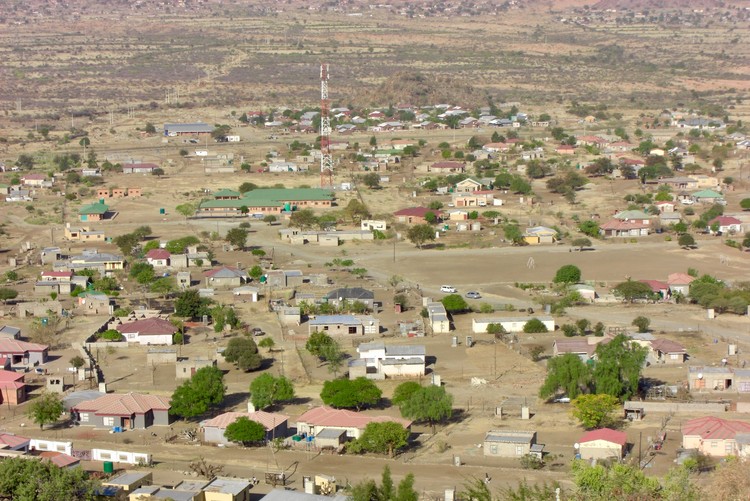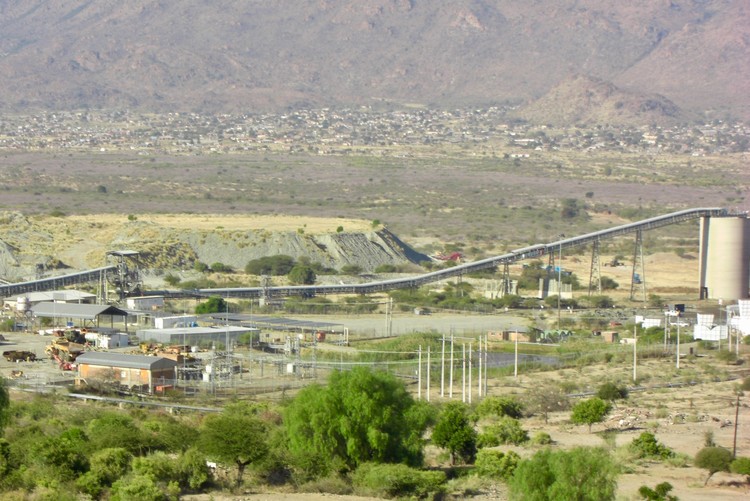Limpopo villagers say Bokoni mine has disrupted their lives
Monametse residents blame the mine for cutting them off from access to river water, grazing land and plants essential for traditional ceremonies.
Monametse village in Limpopo is located between two shafts of the Bokoni Platinum mine. Villagers say mining operations have negatively impacted on their access to water, grazing land and firewood. Photos: Bernard Chiguvare
- Villagers in Limpopo blame the Bokoni mine for the Monametse River running dry.
- They say open cast mining on Sehlakwe mountain has cut off their access to firewood, pastures and plants essential for traditional ceremonies.
- A few households relocated for mining operations in 2014 live in houses that repeatedly crack from mine blasting and have overflowing septic tanks.
- New owner African Rainbow Minerals, which acquired the mine in September 2022, says it is engaging the affected families through social responsibility initiatives.
Residents of Monametse, a village located between two shafts of the Bokoni Platinum Mine in Limpopo, are calling on the mine to take measures to mitigate its impact on their lives.
They blame the mine for the Monametse River running dry and say other sources of water have also been diverted by the mine.
Villagers say Sehlakwe mountain once provided them with water, firewood and grazing land. But last year, the mine expanded its operations with open cast mining on top of the mountain. They say the mine has cleared vegetation essential for circumcision ceremonies and for making ceremonial garments. They now have to travel up to 20km to find the plants they need.
In 2014, 45 households in Monametse were relocated to make way for mining operations. Community leader Moshabi Selowa says the relocation was without written agreement. He says the mine promised residents proper compensation for the land and fruit trees they lost.
Residents were relocated to new houses with indoor toilets. But within a short period of time, the houses started cracking, and there were a number of other issues, he says.
Many people were unable to afford the cost of electricity for cooking, so they built makeshift kitchens outside using zinc sheets. The houses have septic tanks, but these overflow and people have now dug pit toilets.
Selowa says they raised these concerns with the mine. In response, from 2018 to 2023, the mine either rebuilt or renovated their homes.
Resident Gloria Kodibona says although her house was renovated last year by the mine, large cracks have reappeared. She blames blasting.
“I am not sure what materials were used [to build] … If the mine can’t construct stronger houses, it should move us to safer places,” says Kodibona.
The Brakfontein shaft of Bokoni mine.
GroundUp visited the mountain last month with village headman Johannes Makgopa. He showed us a place where people used to drink water.
Cattle once drank water from the river near the village, but they now have to graze five kilometres away. This puts their animals at risk of theft, says Makgopa.
“Most people in our community cannot afford electricity that lasts them the whole month, so firewood is essential. But the area with good wood is now fenced off by the mine,” he says.
We met a family returning from collecting firewood. The family had collected milkbush. Makgopa says people had to resort to burning milkbush, but it is unsuitable for cooking and its sap can irritate one’s skin.
Bokoni Mines told GroundUp that while various issues date back to 2014, the current owner, African Rainbow Minerals, only acquired the mine from Anglo American Platinum and Atlatsa Resources Corporation in September 2022.
“Bokoni Platinum Mines is aware of some of the concerns raised by members of the local community. As a responsible corporate citizen, Bokoni has engaged the affected families to offer assistance through its ongoing social responsibility initiatives, including engaging the services of experts to conduct the necessary assessments. These efforts reflect our commitment to contributing positively to the living conditions of communities surrounding our mining operations,” the company stated.
It took a week for spokesperson Lemson Moropjane of Sekhukhune District Municipality to tell us that the municipality was unable to comment as it “is still investigating” the septic tank sewage problems.
The Department of Mineral Resources and Energy failed to comment.
Support independent journalism
Donate using Payfast

Don't miss out on the latest news
We respect your privacy, and promise we won't spam you.
Next: Debate: Will the Employment Equity Act transform companies or slow growth?
Previous: People have to relieve themselves in open fields in this Eastern Cape town
Letters
Dear Editor
A few kilometres away from Bokoni mine, a community faces the same issues. In Mecklenburg there is an open surface mine called Chromex. On the 3rd of July, they blasted, and our lives haven't been the same since then. Our homes are dilapidated. For weeks, we had to endure cold nights because our windows were broken from the blast. We were told our homes will be fixed in phases – fixing of windows being the first phase. That phase is still not done three weeks later. In an interview, mine management said DMRE has done their checks and they're satisfied because the residential area is 500m away from the mine.
© 2025 GroundUp. This article is licensed under a Creative Commons Attribution-NoDerivatives 4.0 International License.
You may republish this article, so long as you credit the authors and GroundUp, and do not change the text. Please include a link back to the original article.
We put an invisible pixel in the article so that we can count traffic to republishers. All analytics tools are solely on our servers. We do not give our logs to any third party. Logs are deleted after two weeks. We do not use any IP address identifying information except to count regional traffic. We are solely interested in counting hits, not tracking users. If you republish, please do not delete the invisible pixel.


